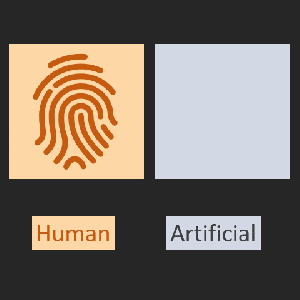Everyone needs to find their response to the question of what humans can do better than an AI. Here is mine.
Until recently, comparing human intelligence with AI typically involved pointing to some bigger feat that machines could not perform: some ‘higher order’ thinking such as coming up with an idea, understanding and solving a problem, or generating a creation. But after the shock by the famous chat bot, the complacency has been shattered, and bemusement and cluelessness are barely hidden behind badmouthing and belittling, or quickly jumping on the bandwagon.
I think the fixation on the qualitative degree of a feat, was distracting and misleading. Now that the principle and the building blocks of the human archetype of intellectual activity are being understood and copied, no degree/ amount/ extent of human performance can remain unchallenged.
Instead, the distinguishing feature is the subjectivity and individuality, grounded and developed on a unique personal background, that makes human thought so valuable to others.
This difference largely determines what I will expect from AI.
There are cases where people do not need or want a personal counterpart to engage with.
- I might be perfectly happy doing self-service with an anonymous agent whose agency is only optimized to get me in some target state such as having some predefined knowledge or skill. Note that I may select a personal subset that interests me, or my personal gaps get individually detected and filled by a personalized service, but the target is modelled after a centralized template and there is no mutual influence possible or necessary, and no emphasis and weighting or bias of what is particularly relevant from either point of view is desired. Acquiring ‘objective’ knowledge would be an example for this one-sided case of personal activity.
- Another case of one-sided activity is the magic of the Brownies of Cologne where the AI does all the thinking for me. Some hyped prostheses called ‘tools’ for thought are expected to deliver that magic.
In most other cases, however, an anonymous unpersonal automat is just frustrating, even though this might be not noticeable from the start.
- Generative creative arts delivers impressive results that may even be unique, by applying random and combinatorics. Like human arts, it may tickle the sense of surprise and the desire of novelty and help appeasing boredom, for example by juxtaposing unexpected elements. Drawing from a vast anonymous mass of sources, however, it creates anonymous mass products, comparable with the ‘Belling stag’ or the ‘Mediterranian with jar’ from the department store. And from the multiple random variations one cannot recognize a pattern that could reveal something about the artist.
- Other kinds of creativity, like finding solutions for problems, will also often involve a new juxtaposition of concepts from different domains, a distant association. And it may be tempting to apply AI and random to produce such new combinations. But without an individual sense of relevance, the raw mass of combinatorial links is just futile to sift through. And no, it is not possible to communicate one’s personal weightings to the AI via verbal prompts that are limited to explicit ideas and exclude the tacit knowledge.
- There are many cases that only work with a genuine human. Learning by early imitation, shared gazing and trust, relationships of care and coaching and fostering independence, are all relying on that the other is a genuine human as well. And genuineness is typically recognized from an individual personality as opposed to a templated automated mass instance (unless betrayed, which is why mandatory labeling is the most important part of AI transparency).
Finally, the question might remain: why can’t robots be subjective and individual? I think, theoretically and in some extreme thought experiments, they could indeed be. Of course it would not suffice to apply some randon generator for many single features of their ‘personality’ because this would make just confusion and not a consistent whole like a human. Rather, they would have to be ‘raised’, and grow from a trusted grounding into diverse individuals. Of course, it is difficult to imagine how an AI could be subjective and — without embodiment into meat — be sentient and have passions or even empathy. Therefore, it might be useful to think of them as alien intelligences: as if they were from a different planet. These intelligences are equally difficult to imagine, but very probably do exist nevertheless. Supposed that AIs grow similarly as humans, and since they share the network properties of our own neuronal networks, it is then no longer absurd to suspect that some subjective and passionate forms might be constructed. Not absurd, just very alien.
But probably it would be much too costly for the investors to produce such devices, and they would certainly not fit ideally into the economic model of mass production.



Thanks to Stephen Downes for the comment https://www.downes.ca/post/74967 . Indeed I did not think of this interesting aspect, just of the cooperation and division of labor with AI.
LikeLike
Pingback: Imagination and understanding | x28's new Blog